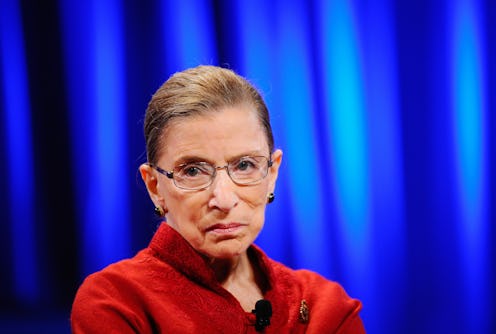News
Ruth Bader Ginsburg Wrote A FIERY Dissent Against The Masterpiece Cake Decision

One of the cases the Supreme Court was deciding on this session that drew the most national attention was Masterpiece Cakeshop v. Colorado Civil Rights Commission, in which a Colorado baker was defending his right to refuse to bake a cake for a same-sex wedding ceremony based on religious grounds. The Supreme Court ruled in the baker's favor, but not everyone was on board. Justice Ruth Bader Ginsburg's Masterpiece Cakeshop dissent was a fiery piece co-signed by Justice Sonia Sotomayor.
You can read the full decision here. Ginsburg's dissent begins on page 11.
Ginsburg's dissent introduces a series of cases about a similar issue, and then relies on one key difference between Masterpiece and the other cases. The past cases concerned a man named William Jack, and they were brought into this case in the form of an amicus brief. Jack, according to the brief, had been denied service at three Colorado bakeries after requesting two cakes shaped like Bibles that showed an image of two men holding hands covered by a red "X." It also asked for several Bible verses condemning homosexuality. The bakeries, according to Ginsburg's dissent, all refused to create cakes that held those messages.
However, the bakeries had not denied Jack based on his religious beliefs, because they frequently created cakes displaying Christian themes. Instead, they declined to create the cakes as he desired because of the messages, which at least one of them called "hateful."
The bakers, Ginsburg argued, in denying Jack the service he requested, treated him exactly as they would have treated any other person requesting the same service, regardless of his religious beliefs. In the Masterpiece case, however, Ginsburg argued that the baker, Jack Phillips, denied the two men, David Mullins and Charlie Craig, service specifically because they were gay.
"The bakers visited by Jack would have sold him any baked goods they would have sold anyone else," Ginsburg wrote, and then she continued:
The bakeries’ refusal to make Jack cakes of a kind they would not make for any customer scarcely resembles Phillips’ refusal to serve Craig and Mullins: Phillips would not sell to Craig and Mullins, for no reason other than their sexual orientation, a cake of the kind he regularly sold to others.
Her next argument specified the exact nature of the cake that Craig and Mullins were seeking:
When a couple contacts a bakery for a wedding cake, the product they are seeking is a cake celebrating their wedding—not a cake celebrating heterosexual weddings or same-sex weddings—and that is the service Craig and Mullins were denied.
"The fact that Phillips might sell other cakes and cookies to gay and lesbian customers was irrelevant to the issue Craig and Mullins’ case presented," Ginsburg wrote. "What matters is that Phillips would not provide a good or service to a same-sex couple that he would provide to a heterosexual couple."
The majority opinion, which Justice Anthony Kennedy wrote, focused on a different aspect of the case, as CNN reported. While the majority agreed that sexual orientation was a protected class, the decision rests on the claim, which the Court agreed with, that the Colorado Civil Rights Commission had acted with "hostility" toward Phillips, based on his religious beliefs. According to The New York Times, the Court's ruling, even while siding with Phillips, strongly supported the existing protections based on sexual orientation and left the door open for future cases that could prove more decisive in either direction. Ginsburg's dissent, on the other hand, would have created a much stronger precedent on the side of gay rights if it had been the majority opinion, but this decision in no way means that an argument such as hers couldn't become the majority opinion in a future case.